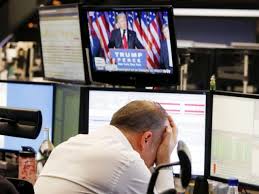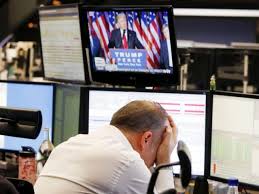
Doubts about whether markets would get the stimulus and the pro-growth policies of tax reform promised by President Donald Trump and the Republican Congress are being raised by them for the first time since the election.
Trump was brought out earlier Tuesday by the GOP to serve as pitchman to House Republicans who may have been wavering ahead of Thursday's vote as the repeal of Obamacare appears to have hit some snags. The markets certainly took the lack of clear majority support as a negative even though whether Trump won votes or not is unclear.
"I think it's certainly interesting the market is questioning it, based on the limited amount of votes the Republicans can afford to lose in the House. It suggests if you thought this party would be voting as a block on the key agenda items, that might not be the case," said Mark Cabana, head of U.S. short rate strategy at Bank of America Merrill Lynch. "It might be a lot more fractured party than many might have anticipated."
Investors snapped up bonds as they sold stocks. Treasury moved lower as a result as they move inversely to price. Falling from a high of 2.49 percent earlier, the 10 year Treasury note was yielding 2.43 percent.
"That's in the context of a market that was priced for the ultimate outcome," said Peter Boockvar, chief market analyst at The Lindsey Group. since Election Day, The Dow is up 13 percent. Questions about how the stimulus and tax reform promised by Trump would be paid for had been ignored by the market, Boockvar said. "Now people are beginning to realize there's potentially other issues."
There had not been a clear move in response to the concerns about the health-care reform since stocks started going higher right after the election, even though the possibility of that becoming a quagmire has been a concern for markets for weeks.
Tax reform would be up next on the agenda, after the health-care act, Trump administration officials have promised. And the market had been hoping there would be movement on it by August.
House Speaker Pau Ryan and when Trump spoke to House Republicans Tuesday morning, he "knocked the ball out of the park". The House's conservative Freedom Caucus claimed that the American Health Care Act does not have enough votes to pass the chamber and Ryan also pushed back against that claim. Unless there are significant changes, the group later threatened formal opposition of the bill.
"From a policy point of view, this is the first real test of Ryan, McConnell, Trump. Is it a juggernaut or isn't it a juggernaut? The markets are more interested in a substantial point of view on what's going to happen on taxes, and what's going to happen on regulatory reform," said Tom Block, Washington policy strategist at Strategas. It faces opposition in the Senate, where Sen. Mitch McConnell is the majority leader even if the bill does pass the House.
"I certainly do think if this doesn't go through, it increases the risk of a risk-off move and you could see a temporary movement into bonds," said Cabana. "We still remain overall optimistic something will get done, and that underlies our view for higher overall rates. The Fed is going to continue to move gradually. We do believe rates will move higher. This certainly does increase near-term downside risk."
"Investor positioning argues for a risk rally pause in March/April, with allocation to equities at a two-year high and bond allocation at a three-year low," said Michael Hartnett, BofAML's chief investment strategist said in a note. "Policy is the key catalyst for the Icarus trade to fly higher in the coming months."
(Source:www.cnbc.com)
Trump was brought out earlier Tuesday by the GOP to serve as pitchman to House Republicans who may have been wavering ahead of Thursday's vote as the repeal of Obamacare appears to have hit some snags. The markets certainly took the lack of clear majority support as a negative even though whether Trump won votes or not is unclear.
"I think it's certainly interesting the market is questioning it, based on the limited amount of votes the Republicans can afford to lose in the House. It suggests if you thought this party would be voting as a block on the key agenda items, that might not be the case," said Mark Cabana, head of U.S. short rate strategy at Bank of America Merrill Lynch. "It might be a lot more fractured party than many might have anticipated."
Investors snapped up bonds as they sold stocks. Treasury moved lower as a result as they move inversely to price. Falling from a high of 2.49 percent earlier, the 10 year Treasury note was yielding 2.43 percent.
"That's in the context of a market that was priced for the ultimate outcome," said Peter Boockvar, chief market analyst at The Lindsey Group. since Election Day, The Dow is up 13 percent. Questions about how the stimulus and tax reform promised by Trump would be paid for had been ignored by the market, Boockvar said. "Now people are beginning to realize there's potentially other issues."
There had not been a clear move in response to the concerns about the health-care reform since stocks started going higher right after the election, even though the possibility of that becoming a quagmire has been a concern for markets for weeks.
Tax reform would be up next on the agenda, after the health-care act, Trump administration officials have promised. And the market had been hoping there would be movement on it by August.
House Speaker Pau Ryan and when Trump spoke to House Republicans Tuesday morning, he "knocked the ball out of the park". The House's conservative Freedom Caucus claimed that the American Health Care Act does not have enough votes to pass the chamber and Ryan also pushed back against that claim. Unless there are significant changes, the group later threatened formal opposition of the bill.
"From a policy point of view, this is the first real test of Ryan, McConnell, Trump. Is it a juggernaut or isn't it a juggernaut? The markets are more interested in a substantial point of view on what's going to happen on taxes, and what's going to happen on regulatory reform," said Tom Block, Washington policy strategist at Strategas. It faces opposition in the Senate, where Sen. Mitch McConnell is the majority leader even if the bill does pass the House.
"I certainly do think if this doesn't go through, it increases the risk of a risk-off move and you could see a temporary movement into bonds," said Cabana. "We still remain overall optimistic something will get done, and that underlies our view for higher overall rates. The Fed is going to continue to move gradually. We do believe rates will move higher. This certainly does increase near-term downside risk."
"Investor positioning argues for a risk rally pause in March/April, with allocation to equities at a two-year high and bond allocation at a three-year low," said Michael Hartnett, BofAML's chief investment strategist said in a note. "Policy is the key catalyst for the Icarus trade to fly higher in the coming months."
(Source:www.cnbc.com)





